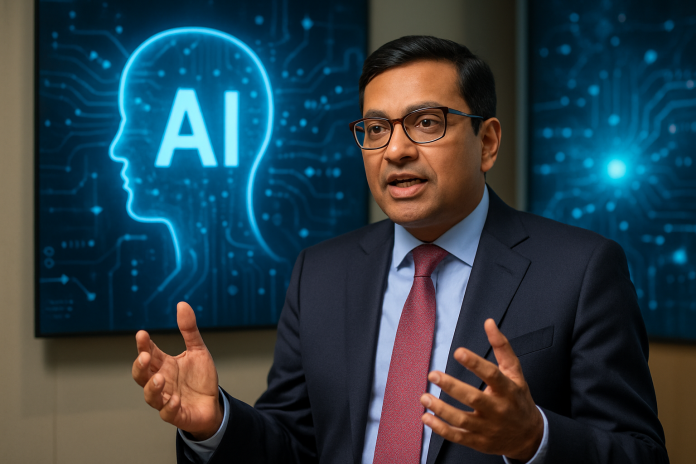Quick Take
- Vikas Khemani predicts India will emerge as global AI leader by 2033
- U.S. trade tensions viewed as temporary electoral rhetoric with limited impact
- Indian IT companies expanding AI capabilities despite pharma sector pressures
- Market consolidation may trigger growth surge in next 6-8 months
- India’s tech startup ecosystem compared to past breakthrough successes
India positioned for AI dominance despite trade headwinds, says Carnelian founder
India is poised to become a global powerhouse in artificial intelligence by 2033, according to Vikas Khemani, Founder and Chief Investment Officer of Carnelian Asset Management. The prediction comes as trade tensions with the United States continue to create uncertainty across India’s pharmaceutical and IT sectors.
Khemani’s bold forecast goes against the grain of concerns about geopolitical risks. He sees India’s AI development as largely immune to current diplomatic friction between the world’s two largest democracies.
The asset manager’s confidence reflects growing belief in India’s tech capabilities and its strategic position in the rapidly expanding global AI market.
Trade Tensions Dismissed as Electoral Theater
Khemani isn’t worried about immediate threats from shifting U.S. policies. He views recent tensions as electoral rhetoric that won’t have lasting impact on Indian businesses. The veteran investor argues that punitive measures against Indian companies could actually hurt America more than India.
“These actions may lead to inflation within the U.S. rather than harming Indian companies,” Khemani states, emphasizing that India’s pharmaceutical exports focus primarily on generic drugs.
This positioning keeps Indian companies away from the kind of tariff battles that typically target more sensitive strategic sectors.
Sectoral Resilience Built on Global Expansion
Indian IT and pharmaceutical companies have built strong defenses against policy uncertainty through smart global expansion and solid economic fundamentals. Khemani points out that mid-sized IT companies are especially well-placed, actively boosting their AI capabilities in ways that echo previous tech revolutions.
The pharma sector’s focus on generic drugs offers extra protection from trade disputes. Unlike companies making proprietary drugs or advanced tech that face scrutiny during diplomatic tensions, generic drug makers serve critical global health needs that go beyond politics.
Startup Ecosystem Mirrors Historical Success Stories
Khemani sees similarities between India’s current AI phase and the country’s earlier tech successes. He cites Zoho’s rise as a blueprint for what’s coming. The software company’s journey from a Chennai startup to global enterprise software leader shows India can create world-class tech firms.
“Much like Zoho’s rise, new startups are quietly positioning themselves to lead globally,” Khemani reflects.
This comparison highlights his belief that India’s AI sector will follow the same patterns of organic growth and international expansion that marked earlier technology waves.
The asset manager notes that many world-class tech companies have emerged from India over the past decade. This creates a solid foundation for continued innovation in AI applications and infrastructure.
Market Dynamics Signal Growth Potential
Current market conditions suggest India’s technology sector may be hitting an inflection point. Khemani describes the Indian market as entering a consolidation phase that usually comes before major growth spurts as global uncertainties settle down.
His analysis shows market dynamics often develop in ways that surprise conventional thinking. This creates openings for significant expansion.
“The market’s surprise elements often unveil themselves against conventional expectations, potentially paving the way for substantial growth in the next 6-8 months,” Khemani concludes.
This timeline fits with his broader view that India’s AI capabilities will accelerate as global supply chains adapt and international partnerships move beyond current political constraints.
Strategic Positioning for AI Leadership
India’s path to AI leadership by 2033 depends on several factors coming together: a strong startup ecosystem, proven IT sector expertise, cost-effective innovation capabilities, and growing domestic market demand. Khemani’s prediction shows confidence these elements will create lasting competitive advantages.
The timeline also gives current AI initiatives time to mature and allows development of homegrown technologies that could challenge established players in key markets. India’s traditional strengths in software development and mathematical sciences provide natural advantages in machine learning and algorithm development.
As global businesses increasingly integrate AI solutions, India’s combination of technical talent, cost efficiency, and market scale puts the country in position to capture significant value in the expanding AI economy.






